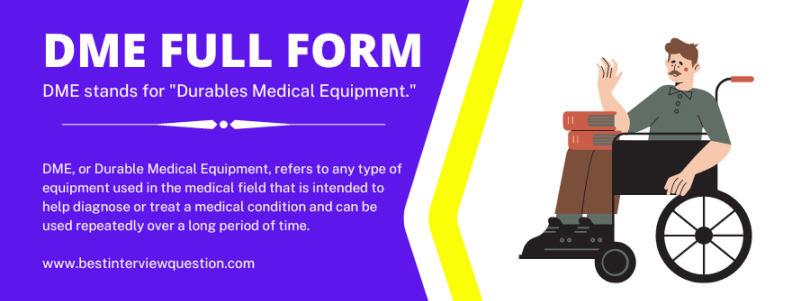Full Form of DME
Durable Medical Equipment
DME, or Durable Medical Equipment, refers to any type of equipment used in the medical field that is intended to help diagnose or treat a medical condition and can be used repeatedly over a long period of time.
The use of DME in medicine includes:
- Mobility aids: Wheelchairs, walkers, crutches, and canes help patients with mobility issues move around more easily.
- Respiratory equipment: Oxygen tanks, nebulizers, and ventilators help patients with breathing difficulties to get the air they need.
- Orthopedic equipment: Braces, prosthetics, and orthotics help patients with bone and joint injuries and conditions.
- Incontinence products: Diapers, catheters, and ostomy bags help patients manage incontinence.
- Monitoring devices: Blood glucose monitors, blood pressure monitors, and pulse oximeters help patients monitor their health conditions.
- Home care equipment: Hospital beds, lift chairs, and patient lifts help patients recover at home after surgery or injury.
- Rehabilitation equipment: Exercise bikes, treadmills, and weightlifting equipment help patients regain strength and mobility after injury or illness.
Other Full Forms
- Direct Medical Expenses
- Dimensionless mathematical entities
- Distilled Monoglycerides
- Diameter Message Exchange
- Durable Medical Equipment
Pros of DME:
- Increased accessibility: DME (durable medical equipment) makes medical treatment and care more accessible for patients who need it, especially for those who are unable to move around.
- Improved quality of life: DME can improve the quality of life for patients, as it provides them with the necessary equipment to maintain their independence and comfort.
- Cost-effective: DME is often a cost-effective alternative to inpatient hospital care, as it allows patients to receive the same level of care at home.
- Customizable: DME can be customized to meet the specific needs of each patient, making it more effective in treating the patient's condition.
Cons of DME:
- Limited availability: DME is not always readily available in all areas, making it difficult for patients to access the equipment they need.
- High cost: DME can be expensive, making it difficult for patients with limited financial resources to afford the equipment they need.
- Maintenance and repair: DME requires regular maintenance and repair, which can add to the cost of care.
- Complexity of use: Some DME is complicated to use and requires special training to operate, making it difficult for patients to use the equipment on their own.
- Insurance coverage: DME is not always covered by insurance, making it difficult for patients to afford the equipment they need.
BY Best Interview Question ON 31 Jan 2023
